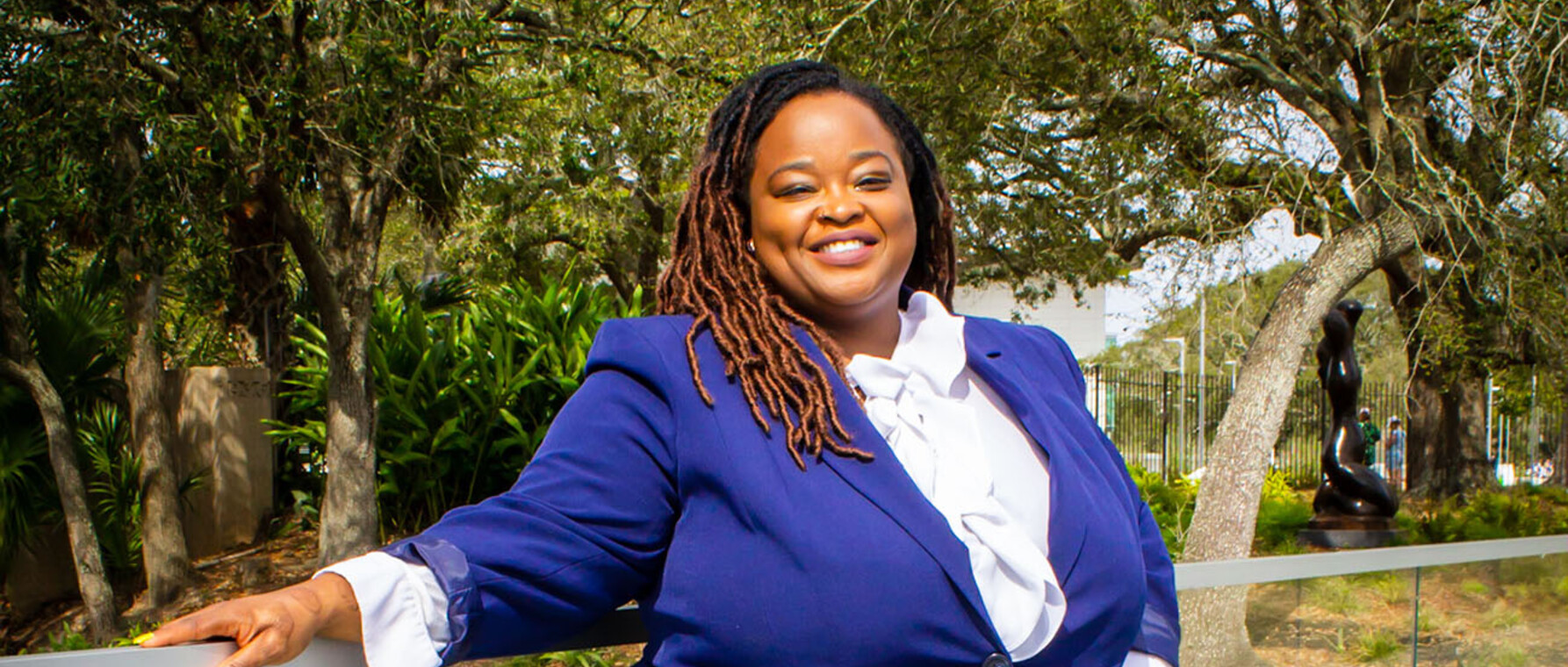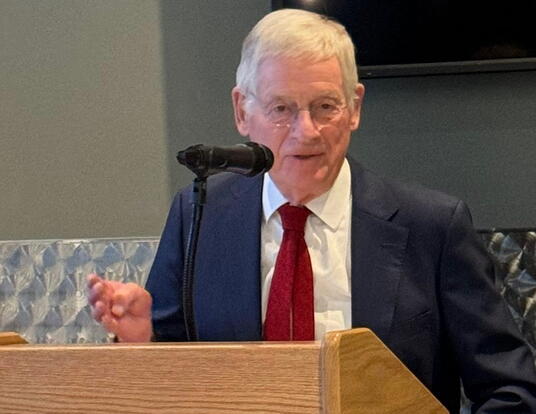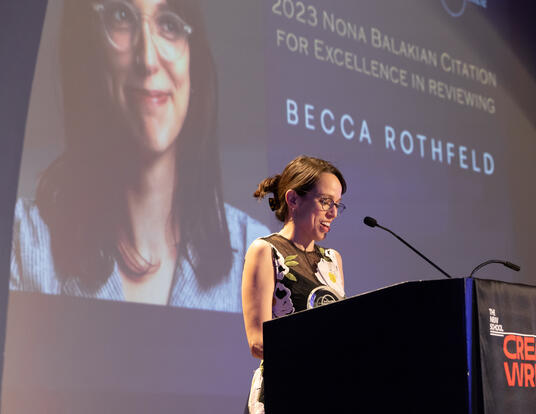A Sense of Journey
Khytie Brown travels for research to illuminate how religio-social relations are based in the senses

Khytie Brown’s family recounts her being able to read and talk before she could walk. “People in my community said it wasn’t normal for babies to talk at that age and asked my family if they were afraid that I was a witch,” she laughs. Brown, a PhD candidate in the Department of African and African American Studies with a primary field in religion, cites the women in her life as her major influences growing up. “They really cultivated my love for reading and learning,” she says. “There was nothing I couldn’t ask for in terms of books that my mother wouldn’t get for me.”
Brown remembers the pivotal moment that led her to academia. As a joint sociology-religion major during college, she gave a presentation that impressed her professor so much, he drew her aside after class to ask if she would “like to do what he does” for her future career. “At the time, I didn’t even really know what professors did,” Brown laughs. He introduced her to the Mellon Mays Undergraduate Fellowship, a program for underrepresented minorities designed to increase diversity in institutions of higher learning. Through the program, Brown fell in love with the process of research and creating knowledge. “I grew up admiring the people speaking on National Geographic, and I now realized I could become one of them,” she says.
Religion is an important part of Brown’s life. “In Jamaica, religion and religious experiences were formative to how I grew up,” she explains. Brown recounts a course in college that taught students how to craft a memoir. “I realized that religion was very pronounced in my memoir. College made me realize that religion could be a subject for analytic study.” Brown went on to receive a master’s degree from Harvard Divinity School, where her concentration was religion and the social sciences. “The classes were eclectic and challenging, but it confirmed how much I liked thinking about religion.”
When applying for PhD programs, Brown applied to mostly africana studies instead of religion programs. “I wasn’t sure if my ultimate project would be solely about religion or have wider import that was more cultural, so I wanted a department that was interdisciplinary,” she says. “I believe that the world is multi-layered and multisensorial. I’ve never liked being pigeonholed into one box.”
The Hierarchies of the Senses
Brown concentrates her research on Revival Zion, a marginalized Afro-Christian religion from Jamaica. Even though its number of practitioners is small, the movement’s cultural impact is large. “It’s one of the few indigenous Jamaican Christianities, and everyone knows it is a foundational element of Jamaican religious history,” Brown explains. “Anywhere there is a Jamaican diaspora, you will find Revivalists.”
Revival Zion had always been in the background of Brown’s childhood in Jamaica. “I grew up with it in my own backyard, but it took me coming to America and studying religion for me to go back and re-examine this part of home,” she says.
Through her research, Brown advances the idea that the practice of Revival Zion is misunderstood as Obeah, or demonic, because of its wide array of trance-based sensory and sensuous rituals. The complexity of these somatic rituals is viewed by many as the incorrect way to worship God. She recounts a defense made by a Revival bishop, who argued, “People don’t like us because we use a lot of material in our religion. They want us to sit down and act like we’re dead, but when we feel the Holy Spirit, we move a certain way and create certain sounds. When that power comes, you can’t keep quiet.”
For Brown, the prejudice against Revival’s sensorial practices is due to a loaded history of colonial understandings of African indigenous practices, as well as laws against African-based practices not based in Euro-Christianity. “The suspicion of Revival Zion demonstrates a culture deeply steeped in internalized Afrophobia, which is the fear and suspicion of things that are African,” she explains.
In Brown’s opinion, scholarship has not paid enough attention to the senses. “The senses are not just physiological or biological, but culturally mediated,” she says. “I’m trying to pay more attention to the ways we create, construct, and manage differences through these sensory hierarchies.” Through Revival, Brown began considering sensory hierarchies in religion more broadly, observing that these attitudes towards the sensory contributed to arguments between Catholics and Protestants during the Reformation. “They were arguing about who gets to use the senses, and the ‘correct’ way to do it,” she explains.
The Act of Journeying
In traditional ethnography, the researcher travels to a place and lives with the study’s participants in their real-life environment. “I carry out a methodological intervention,” states Brown. “A major aspect of my methodology is the act of journeying itself.” She explains that journey-making is an important aspect of Revival Zion. As a trance-based religion, Revivalists see themselves as spiritually traveling through ritual journeys and, increasingly, are traveling physically across borders to Panama and North America to practice with other stigmatized practitioners. “It made more sense for me to go with them as they were traveling to different places,” she says.
Brown’s two-year ethnographic research work in Jamaica and Panama was funded by the Lee Whittinghill Samuelson Traveling Fellowship. “If you don’t apply for a traveling fellowship, it’s expensive to fund your own travel for research,” she says. But Brown also recognizes that interacting with the participants of her study has enriched her research, helping her realize that the language of academia isn’t always appropriate in the field. “There’s a gap between how we’re trained to think, going out to the field for the first time, and how that matches up with reality,” Brown explains. “Traveling for research taught me to unlearn certain things, to really listen to people, and to see what was actually happening. For me, this was a very big pro of traveling.”
Being away from campus meant that she was removed from a familiar intellectual community, with limited access to resources, such as an office or writing groups. But for Brown, the advantages of traveling outweigh its challenges. “You get to experience the world, experience people, and really immerse yourself in what you’re studying,” she says.
Brown’s advice to students considering traveling fellowships is that they apply as early as possible. “Traveling for research might make your program longer, but it really changes the nature of your research,” she says. “Give yourself time not just to travel, but also to come back and reflect on what you’ve seen and discovered, and what direction you would like your research to go.”
Photos by Matthew Wade/VIA.MATEO Photography
Get the Latest Updates
Join Our Newsletter
Subscribe to Colloquy Podcast
Simplecast Stitcher





